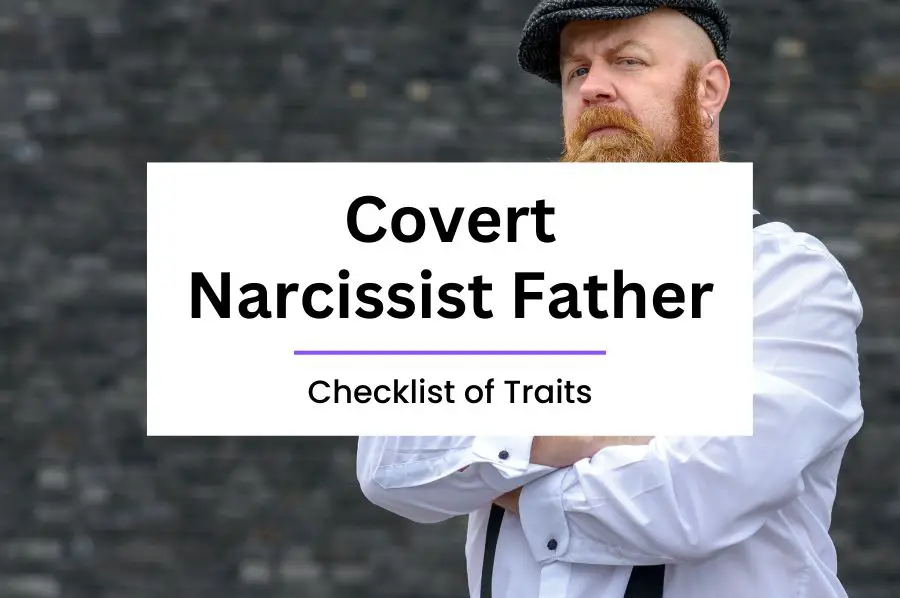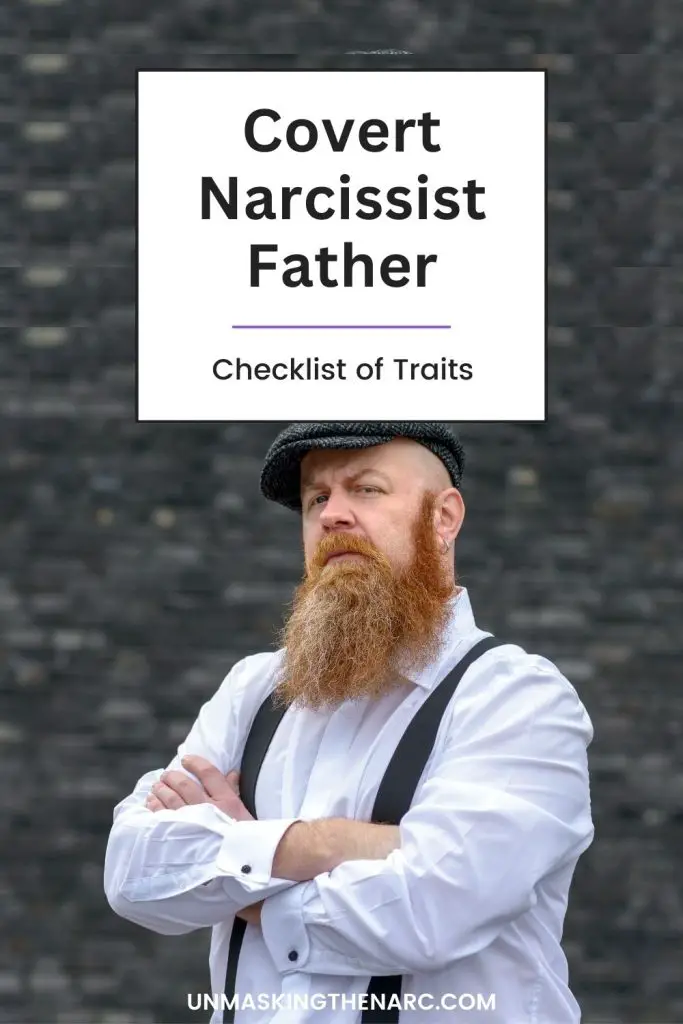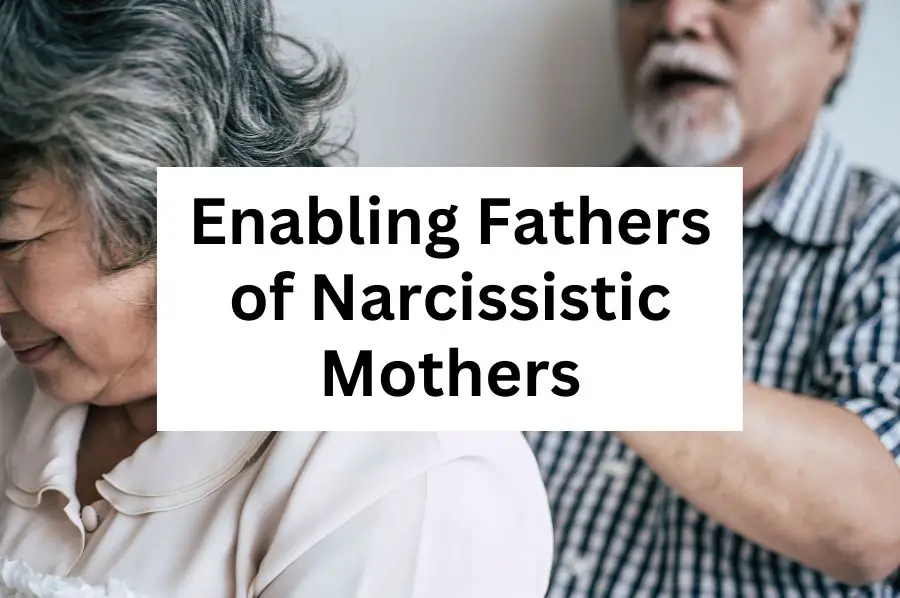Growing up with a covert narcissist father is confusing. Externally they seem helpful and self-effacing, yet there’s a deep undertone of selfishness that is often more apparent in the home than when out in public.
They are very good at playing the victim and using guilt to get their family members to do what they want, all while pulling them down with underhanded criticisms and devaluations.
Use the covert narcissist father checklist to gain a deeper understanding of how the covert narc dads operate.
This post contains affiliate links, for more information, see our disclosures here.
Covert Narcissist Traits
Covert narcissism is characterised by a more subtle and inward-facing expression of narcissistic traits compared to the overt form. However, the belief that they are superior and special is just as dominant as with any other type of narcissism.
Overt (grandiose) narcissists have an extreme sense of superiority and confidence, which is why they feel entitled to special treatment. They do not feel shame and genuinely believe themselves to be a perfect, God-like specimen.
On the other hand, covert narcissists feel shame on the regular and do not exude the same confidence as the grandiose variety.
While grandiose narcs believe that validation should just come to them because of how amazing they think they are, covert narcissists are the opposite. They need to receive validation from the outside world to prop them up and reinforce the belief that they are special and superior.
Common Covert Narcissist Traits:
- Insecurity: Covert narcissists have deep-seated feelings of inadequacy and insecurity, despite projecting a more reserved or self-effacing exterior.
- Seeking Validation: They crave attention and admiration but often do so more passively or subtly. They may fish for compliments, seek sympathy, or present themselves as victims to gain attention and validation.
- Manipulative Behaviour: They can be manipulative, using tactics like guilt-tripping, playing the victim, or employing passive-aggressive behaviour to control situations or people around them.
- Lack of Empathy: Similar to overt narcissists, those with covert tendencies struggle with empathy. They don’t have the compassion required to care about other people’s emotions.
- Grandiosity Behind Closed Doors: While not openly displaying grandiose behaviour, covert narcissists may harbour fantasies of success, power, or uniqueness that they keep hidden and only reveal in private or to close confidants.
- Fragile Ego: Covert narcissists are often hypersensitive to criticism or perceived slights. They will react strongly to any form of rejection or negative feedback, even if it’s constructive.
- Difficulty in Maintaining Relationships: Their emotional unavailability, manipulation, and lack of empathy can make it challenging for covert narcissists to maintain close, intimate relationships. They might cycle through relationships and struggle to form deep, meaningful connections.
- Modesty as a Facade: Covert narcissists project an image of humility and modesty, which is a contrast with their inner feelings of superiority or entitlement.
- Passive Behaviour: They may display passive behaviours in social situations, preferring to stay in the background rather than seeking the spotlight. However, they still desire recognition and validation.
- Victim Mentality: Covert narcissists often see themselves as victims, using it to elicit sympathy or to justify their actions (avoid accountability).

Covert Narcissist Father Checklist

Now that you’ve got some understanding of what the common traits of a covert narcissist are, let’s see how they can manifest in a parent-child dynamic with the covert narcissist father checklist.
He Has a Grandiose View of Himself
A covert narcissist father may conceal a grandiose view of himself that isn’t easily picked up. Behind a facade of humility and modesty, he holds a deeply ingrained belief in his remarkableness and superiority.
Internally, he constructs an intricate world where he perceives himself as uniquely talented, insightful, or superior to others. This grandiosity isn’t overtly displayed but is reserved for private moments or shared selectively with those deemed trustworthy.
A covert narcissist father lives in a fantasy where he believes himself to be superior, special and entitled. It’s an absolute denial of reality because he cannot accept that he is a flawed human being, just like the rest of us.
A covert narcissist father will fantasise about extraordinary achievements, success, or admiration from others while masking these aspirations behind a seemingly unassuming demeanour in public.
This inner grandiosity serves as a core pillar of his self-worth, despite his outward projection of modesty, which influences his interactions with his children in subtle and often manipulative ways.
There is also an undertone of the covert narcissist dad expecting to be treated better than the rest of the family due to his entitled self-perception.
He Interferes with His Children’s Identity
A covert narcissist father often undermines his children’s development of individual identities by subtly imposing his expectations and desires upon them.
Through the disguise of care and support, he subtly manipulates and controls their choices, opinions, and aspirations, steering them towards paths that align with his own ideals.
To the covert narcissist father, his children are merely an extension of him – pawns to be pushed around to suit his own agenda.
He might use guilt, emotional manipulation, or passive-aggressive behaviour to deter the exploration of their unique interests or independence, subtly conditioning them to prioritise his needs and opinions over their own.
Examples of Interfering with the Children’s Identities:
- Creating a trophy child that he can show off to the world & receive validation for
- Vicariously living through the child & getting them to do the things he always wanted to do
- Snuffing the child’s dreams so they’ll remain his loyal servant
- Scapegoating a child so he’s got someone to project his unhealed wounds onto
The covert narcissist father creates a sense of dependency by constructing an environment where the children feel they must seek his approval for their decisions, thereby stifling their self-discovery and autonomy.
His covert tactics create a dynamic where the children struggle to differentiate their identities from his, composing a childhood where their personal growth is overshadowed by his influence.
He is Passive-Aggressive

A covert narcissist father will regularly use passive-aggressive behaviour as a subtle means of exerting control and manipulation. Through passive aggression, he avoids direct confrontation or overt displays of hostility while still expressing his dissatisfaction and forcing his influence on his children.
He may use tactics such as silent treatment, sarcasm, backhanded compliments, or veiled criticisms to undermine or belittle his children. This behaviour allows him to maintain a facade of innocence or victimhood while subtly asserting power and dominance.
The covert narcissist father keeps his children walking on eggshells with his passive-aggressive behaviour. They often feel confused by what his words really mean, leaving them in a constant state of anxiety.
His passive-aggressive tendencies create an atmosphere of tension and confusion within the family dynamic, leaving the whole household feeling uncertain about his true intentions, yet still feeling the impact of his covert attempts to maintain control.
Examples of Passive Aggressive Behaviour:
- Silent treatment for not doing what he wants them to do
- Sarcastic comments
- Compliments sandwiched between devaluations
- Subtle criticisms
- Moodiness & sulking to play the victim and have his children pander to him
He is Controlling
A covert narcissist father exerts control over his children in subtle yet manipulative ways, shaping their lives according to his desires and expectations.
He will use emotional manipulation, guilt-tripping, or leveraging his role as a provider to subtly steer their decisions, choices, and behaviours.
He might utilise tactics that appear supportive on the surface, such as offering guidance or expressing concern, but these actions always serve his agenda of maintaining control.
A covert narcissist father doesn’t want his children to grow into confident individuals outside of his fantasy realm because then he will no longer be able to control them for his own gain.
His underlying tactic is to instil a sense of dependency on needing his approval so that he can subtly limit and control their autonomy and independence.
His control can extend into all aspects of his children’s lives, from career choices to hobbies and relationships, fostering an environment where the children feel obligated to align with his wishes and stifling their ability to forge their own paths.
Examples of a Covert Narcissist Father’s Controlling Behaviour:
- Criticising the child’s choices & decisions – destabilising their confidence
- Discouraging hobbies, careers and relationships that he doesn’t approve of
- Showing open disapproval for choices outside of his agenda
- Sabotaging the child’s ability to continue with activities he doesn’t like
- Guilt-tripping the child for focussing on something other than him
He Expects His Children to Be Responsible for His Emotions
A covert narcissist father often places the burden of managing his emotions onto his children, expecting them to cater to his needs while dismissing their own.
He subtly manipulates their sense of responsibility by using guilt, emotional manipulation, and portraying himself as a victim to solicit their attention and support. They are made to feel accountable for his happiness and well-being, creating a dynamic where their own emotions and needs take a backseat to his.
The expectation of catering to a parent’s emotional needs can be suffocating for the children. It effectively programs them to minimise their own needs in all areas of life, believing that their needs are not important. The child is more likely to become a codependent over-giver in intimate relationships in adulthood as a result of their childhood conditioning.
He is Quietly Manipulative
A covert narcissist father is not outwardly manipulative because he needs to maintain people’s perception of him as being ‘helpful’ and ‘humble.’ Instead, the covert narcissist father employs a range of subtle manipulations to maintain control over his children’s thoughts, emotions, and actions.
Through emotional manipulation, he will guilt-trip them or play on their sympathies, subtly influencing their decisions while appearing supportive or caring.
“After everything that I’ve done for you…”
– A common phrase to come out of a covert narcissist’s mouth as a way of guilting their children into doing what they want or not abandoning them for outside hobbies and relationships.
He uses praise strategically, doling it out when they align with his desires and withholding it when they assert their independence. This bread-crumbing of validation keeps his children always wanting to do the ‘right’ thing in order to get the validation they so desperately crave from their father.
Creating an atmosphere where seeking his approval becomes paramount, he maneuvers situations to ensure they feel indebted to him for guidance or support.
Children of covert narcissist fathers forever feel indebted to him for all of his ‘kindness’ and ‘support,’ which is nothing short of emotional blackmail.
A covert narcissist father’s manipulations often lead the children to doubt their own judgments, becoming reliant on his opinions and ‘guidance’ with decision-making, ultimately shaping their lives in accordance with his wishes.
He Lacks Empathy
A covert narcissist father cannot truly empathise with his children. There is a noticeable deficit in understanding or validating their emotions and perspectives because in his fantasy reality, he is the only important person, while everyone else is there as a tool to use for personal gain.
The covert narcissist father’s own emotional development was stunted in childhood and has left him unable to authentically tend to the emotional needs of others, including his children. He will always default to only looking out for his own needs due to his inner belief of entitlement and superiority.
The covert narcissist father will actively dismiss the children’s feelings because they do not serve him. He lacks the compassion to genuinely care about their feelings, so they are simply an inconvenience to him.
His inability to connect with their experiences or show authentic concern leaves his children feeling unheard and invalidated. This absence of empathy creates an emotional distance, hindering the development of a nurturing and supportive parent-child relationship, and instead perpetuates a sense of isolation and emotional disconnect for the children.
He Portrays a Positive Public Image

A covert narcissist father meticulously crafts a positive public image, projecting an outward appearance of humility, generosity, and pleasantness to those outside the immediate family circle.
He invests energy into maintaining this facade because he needs to seek validation and admiration from those external sources to prop up his self-esteem. This external validation all feeds into his fantasy illusion of being perfect and superior.
In social settings or public interactions, he presents himself as friendly, good-humoured, charming, and helpful, earning praise and admiration from acquaintances and outsiders. This carefully curated mask serves to bolster his self-image and garner external validation, concealing his true manipulative and self-serving behaviours.
This stark contrast between his public persona and private behaviour creates a dissonance (confusion) for the children of the covert narcissist father. This also makes it difficult for outsiders to believe the children if they talk about how their dad really acts behind closed doors.
He Refuses to Take Responsibility for His Behaviour
The crux of narcissism is the refusal to accept reality, which is that they are an imperfect, regular human being, just like everybody else. This denial of reality happened on such a deeply unconscious level, when the narcissist was a child, that a split in their psyche occured.
The narcissist can only psychologically survive in the fantasy their ego has created, which has them believing that they are perfect, superior and entitled. They effectively think that they are a God that sits at the centre of the universe with all other people being ‘things’ for them to use for personal gain.
As a result, the narcissist cannot accept any evidence to enter their world that goes against this fantasy. In other words, the covert narcissist father cannot accept accountability for any of the horrendous things they say or do, because that would be to admit that they’re not perfect or unique.
To evade this accountability a covert narcissist father will employ subtle tactics to deflect any blame or accountability that comes his way.
How a Covert Narcissist Father Avoids Responsibility:
- Gaslighting – Messing with his children’s perception & memory of things
- Blame-shifting – Blaming his children for the things that he’s doing
- Word salad – Engaging his children in a rabbit warren of topics to detract from the original issue
- Denial – Completely deny words & events
- Invalidating – Downplaying his actions & making his children feel like they’re too sensitive
- Playing Victim – Victimising himself to gain sympathy & evade accountability
- Guilt-tripping – Making his children feel bad for daring to hold him responsible
The covert narcissist father will maneuver conversations or situations in such a way so as to skilfully evade accountability, deflecting fault onto others or external circumstances.
When confronted with his behaviour, he’ll use tactics such as gaslighting, denying or downplaying the impact of his actions, or even projecting blame onto those who challenge him. He will manipulate narratives to absolve himself of any wrongdoing, preserving his self-image as being either ‘faultless’ or ‘the victim.’
This refusal to acknowledge his behaviour not only perpetuates a cycle of abuse but also undermines the emotional well-being of his children, as it leaves them grappling with a sense of invalidation and frustration due to his refusal to accept responsibility.
| READ: 9 Blame-shifting Tactics → |
He Makes You Feel Like You’re Never Enough
A covert narcissist father subtly instills a pervasive sense of inadequacy in his children, leaving them feeling like they can never meet his elusive standards.
Through subtle criticisms, backhanded compliments, or setting unattainable expectations, he programs his children to constantly feel as though they’re never doing enough, nor are they good enough.
The covert narcissist father cannot risk having his children rise above him because then they will abandon him. He will lose his control over them, plus the narcissistic supply that they bring.
Despite their achievements, he may downplay their successes or highlight any perceived shortcomings, creating a dynamic where they consistently seek his approval but rarely receive genuine validation. This perpetual cycle of feeling inadequate leads to a deep-seated belief that they can never measure up to his expectations, contributing to a persistent sense of low self-worth and self-doubt within the children.
He Can Be Violent
Covert (and malignant) narcissistic men are more prone to violence than the other types of narcissists. This comes down to the fact that the covert men believe that they are entitled to all of the fame, glory, riches, success and adoration than any other narcissist, but their low self-worth and lack of confidence means that they’re less likely to acquire those things.
A covert narcissist man will regularly see evidence that he is not anything special, nor is he particularly talented or superior, but his delusional view of himself absolutely cannot stand that truth.
When he’s not receiving validation that supports his fantasy, he will quickly begin to fall into his empty black hole within, which is an excruciating experience. So, he must do something quickly to pull himself back out of his inner void. That’s when he’s likely to explode into a rage as a way of dumping his unhealed wounds onto the nearest person so that he doesn’t have to bear the burdened of them.
Covert narcissist fathers can show violence in many forms, it doesn’t necessarily mean that they physically hit their children (although in some cases that does happen).
Examples of Covert Narcissistic Violence:
- Punching things (like the wall)
- Throwing things in anger
- Being physically violent towards people and animals
- Excessive slamming of doors etc.
- Using violent speech (e.g. “I’ll punch your head in if you don’t cut that out!”)
- Verbal abuse (excessive swearing, using degrading words etc.)
▶️ 11 Traits of a Covert Narcissist Father

Life Beyond the Covert Narcissist Father
Growing up with a covert narcissist father is confusing, creating children with desperately low self-worth and issues with codependency and over-giving (to their detriment).
But, it doesn’t have to be a life sentence. Here are some ways to reclaim your life from your narcissistic father, build your self-worth and reclaim your autonomy.
Accept That He Won’t Change
Firstly, it’s important to realise that your dad’s narcissism isn’t going anywhere. Narcissistic Personality Disorder (NPD) is a mental illness that even intensive therapy isn’t going to fix.
Due to the very nature of narcissism, he does not have the ability or the desire to change anything about himself. For his psychological survival, he must live in a delusional reality whereby he is perfect, special and superior. This means that he is completely blind to all of his faults, because they go against his false version of himself.
If you try to kindly bring any of his flaws to his attention, you will be met with attacks and abuse. Those things must not be allowed access to his false reality because otherwise the whole charade will come crashing down – and that’s a fate worse than death to a narcissist.
Set Your Boundaries

Considering that your narcissistic father is not going to change, if you want to still maintain some kind of relationship with him, you will need to change how you interact with him moving forward.
This means setting clear boundaries on what behaviour you will no longer accept from him. Taking back your power and not allowing him to make decisions about your life might be a big one. Or no longer being spoken to in a cruel and demeaning manner might be another.
Figure out within yourself which of your father’s behaviours you won’t tolerate any more. Then every time he displays one of those behaviours you can let him know that it’s not okay and you won’t be sticking around if he continues with it. Maybe it’s ending a conversation if he tries to take over and control your decision-making. Or walking out the door if he is rude and insulting.
Your covert narcissist father will not like you setting boundaries because that is effectively you saying, “No” to him. Expect for this to be a lengthy process of him disrespecting your boundaries and you continuing to hold and reassert them. Over time, he will learn that you mean business and those things won’t fly with you any more.

Mental Health Check-in
Keep track of your mental well-being with these fun journal sheets!
- Sleep tracker
- Water intake
- Mood/ emotion tracker
- Struggles & ahievements
- Daily + Weekly + Monthly
- PRINTABLE & DIGITAL
Heal Yourself
The most important thing you can do is to focus on your own self-care and healing after a childhood of narcissistic manipulation and abuse.
Therapy is highly recommended as well as focussing on things that help to build confidence and self-worth within yourself. It could be taking up a new hobby that you’ve always wanted to try or even changing your appearance to better reflect your own identity (not who your father expected you to be).
It’s very common for children of narcissists to end up in narcissistically abusive relationships as adults. You end up being a perfect target for narcs since you’ve already got low self-worth and are primed to please others for your own survival.
To be truly narcissist-proof, you need to heal your inner wounds. Narcissists operate by targeting and triggering your wounding so that they can have power over you and extract life force energy (narcissistic supply). When you release your inner wounding, there is nothing left for any narcissist to trigger you with.
Finding a good therapist is one route, which is highly recommended. A daily self-care routine is also essential. After all of the years where you’ve had to put your narcissistic father first for your own survival, now it’s time to take your energy back and put that all into yourself instead.
| READ: Self-care Beyond Narcissism → |
For those who are spiritually inclined, I recommend finding a good energetic worker who can help to shift the trauma from your energetic body for good. This works to clean up the wounding from this life as well as past lifetimes.
Spiritual healing is the quickest way to healing the inner wounding so that you’re free to move forward in your life, finally being fully autonomous and separate from any narcissistic parent or partner.
Below is more information on spiritual healing from narcissistic abuse.

Energetic Healing from
Narcissistic Abuse
If you’ve tried everything to heal but still can’t shift things, it might be time to call in the spiritual realm.
✭ Removal of stuck energy
✭ Removal of old traumas & memories
✭ Past Life Regression
✭ Understanding your journey & how it’s shaped you
✭ Loving & non-judgemental guidance
✭ Psychic mediumship
✭ Ask your guides questions & get direct answers
10% OFF Code ‘UNMASK‘
www.selenahill.com →
▶️ VIDEO: 3 Ways to Deal with a Covert Narcissist Father
Posts About Narcissistic Fathers
- QUIZ: Is My Father a Narcissist?
- Covert Narcissist Father Checklist






